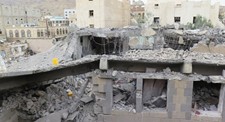Yemen: Airstrike and weapon analysis shows Saudi Arabia-led forces killed scores of civilians
2 July 2015,
New research and weapons analysis by Amnesty International in Yemen bring into sharp focus the high price civilians continue to pay amid the Saudi Arabia-led military coalition’s airstrikes all over the country and demonstrate a failure to abide by the requirements of international humanitarian law.
Amnesty International researchers investigated eight airstrikes in different parts of the country, including multiple strikes in the capital, Sana’a, on 12 and 13 June and in Tai’z on 16 June. In total, the eight incidents killed 54 civilians (27 children, 16 women and 11 men) including a one-day-old infant, and injured 55, (19 children, 19 women and 17 men).
“International humanitarian law is clear that belligerents must take all possible steps to prevent or minimize civilian casualties. But the cases we have analysed point to a pattern of attacks destroying civilian homes and resulting in scores of civilian deaths and injuries. There is no indication that the Saudi Arabia-led military coalition has done anything to prevent and redress such violations,” said Donatella Rovera, Senior Crisis Response Advisor at Amnesty International, who is currently in Yemen.
There is no indication that the Saudi Arabia-led military coalition has done anything to prevent and redress such violations
Donatella Rovera, Senior Crisis Response Advisor at Amnesty International.
“These eight cases investigated by Amnesty International must be independently and impartially investigated as possible disproportionate or indiscriminate attacks. The findings of any investigation must be made public, and those suspected of responsibility for serious violations of the laws of war must be brought to justice in fair trials. All victims of unlawful attacks and their families should receive full reparation.”
Destroyed home of the al-Akwa family in which five civilians were killed in two consecutive airstrikes on 13 June 2015 ©Amnesty International.
A triple strike launched by the coalition against Beit Me’yad, a residential suburb of the capital Sana’a, on 13 June killed 10 civilians – including three children and five women, and injured 28, including 11 children and 10 women – who lived near the intended targets of the strikes.
In one of these strikes a 2,000 lb (900 kg) bomb killed an 11-year-old boy, two of his sisters, his brother, and his 10-year-old cousin, and injured five other members of the al-‘Amiri family. The bomb, identified from the markings on fragments found at the site by Amnesty International, pulverized the house of Yahya Mohamed ‘Abdullah Saleh, a nephew of the former President ‘Ali ‘Abdullah Saleh who has been living abroad for years, and caused extensive damage to the surrounding houses.
Most of the neighbours had fled minutes before the strike – the third in the neighbourhood in less than 10 minutes – but the al-‘Amiri family did not manage to escape on time. “We did not move fast enough,” Mohamed al-‘Amiri, who lost four of his children in the strike, told Amnesty International.
A double strike launched minutes earlier a few streets away destroyed the home of the al-Akwa family, killing 40-year-old Fatma, her two children Malek and Reem, and two of her relatives, and injuring 18 other family members and five neighbours.
Amnesty International spoke to a 12-year-old girl who suffered third-degree burns and shrapnel wounds all over her body as well as a deep cut across her face. She writhed in pain on her hospital bed as she told Amnesty International: “We were all in one room, my mum and my siblings, and the explosion happened and were all hurt. Now my mum, little brother and sister are in another hospital.” Hospital staff told Amnesty International that in fact the child’s family were killed in the strike and they would tell her imminently.
The strike missed its apparent target – Tareq Mohamed ‘Abdullah Saleh, another nephew of the former President, who owns but does not live in a nearby house which was bombed later that night. Media reports citing the Saudi-based Yemeni government’s statement that the strike had targeted and killed Tareq Mohamed ‘Abdullah Saleh turned out to be unfounded.
We were all in one room, my mum and my siblings, and the explosion happened and were all hurt. Now my mum, little brother and sister are in another hospital.
12-year-old air strike survivor
On 12 June, five members of the ‘Abdelqader family were killed in another bombardment which destroyed four adjacent houses in the Old City in Sana’a. The strike would have likely caused many more casualties had many of the neighbours not left the area after a powerful airstrike targeted the nearby Defence Ministry compound (200 metres to the south) two days earlier.
The Saudi Arabia-led coalition spokesman Brigadier-General Ahmed al-‘Assiri denied responsibility for the strike but a fragment of the bomb recovered from the rubble of the houses shows that it comes from a 2,000 lb (900 kg) bomb, the same type which has been widely used by the coalition in various parts of Yemen.
To read more, click this website:
https://www.amnesty.org/en/latest/news/2015/07/yemen-airstrike-analysis-shows-saudi-arabia-killed-scores-of-civilians/

